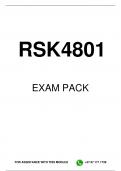RSK4801
EXAM PACK
FOR ASSISTANCE WITH THIS MODULE +27 67 171 1739
, CONFIDENTIAL RSK4801
Page 1 of 23
May/June 2023
UNIVERSITY EXAMINATIONS
May/June 2023
RSK4801
OPERATIONAL RISK MANAGEMENT
100 marks
STUDENT NUMBER
INSTRUCTIONS
This online assessment consists of 23 pages. Please read the Invigilator app instructions
below and scan the QR code.
This paper comprises two sections:
Section A consists of four (4) questions based on a case study.
Section B consists of four (4) essay-type questions.
Write your answers in the designated spaces below the questions or answer the questions in a Word
document and number your answers correctly.
[TURN OVER]
,CONFIDENTIAL RSK4801
Page 2 of 23
May/June 2023
[TURN OVER]
, CONFIDENTIAL RSK4801
Page 3 of 23
May/June 2023
SECTION A [60]
Instructions:
Consider the following case study and then answer ALL the questions related to it.
CASE STUDY
Waste management is becoming a major issue and risk for most South African
municipalities. It is affecting the safety and health of the public and placing pressure
on the management of local governments. Currently, waste management is the least
prioritised municipal service in most South African municipalities and is lagging
behind other services such as housing, water, electricity and road infrastructure.
South Africa only recycles about 10% of its waste, focusing primarily on polyethylene
terephthalate (PET), plastic, paper, and cardboard. Risk exposure for the country is
that it has less than 10 years of useful landfill life left in the Johannesburg, Tshwane
and Cape Town metros. As such, there is an urgent need to find alternative waste
treatment technologies. According to statistics, the eight metropolitan municipalities
have the largest population numbers and generate the largest waste volumes, at
about 10 million to 20 million ton of waste annually, of which the bulk is landfilled.
Material recovery facilities (MRFs) have been established in some municipalities to
recover recyclables. However, the absence of separating waste at the source means
facilities are operated as “dirty” MRFs with high contamination rates and lower
recovery rates than “clean” facilities with low contamination rates. Some of the
challenges facing waste management in South Africa include environmental
authorisations, permitting, licencing and social issues as the primary stumbling
blocks. For example, identifying a suitable site and commissioning a landfill can take
up to 10 years.
Although technologies' CapEx (Capital Expenditure) and maintenance costs for
treating waste are substantial, landfilling remains less expensive than alternative
waste treatment technologies. However, the price for landfilling may even be higher,
given the cost of managing a landfill upon its closure. The life of a landfill may stretch
to about 50 years after it closes. In addition, the absence of carbon taxes means that
[TURN OVER]




